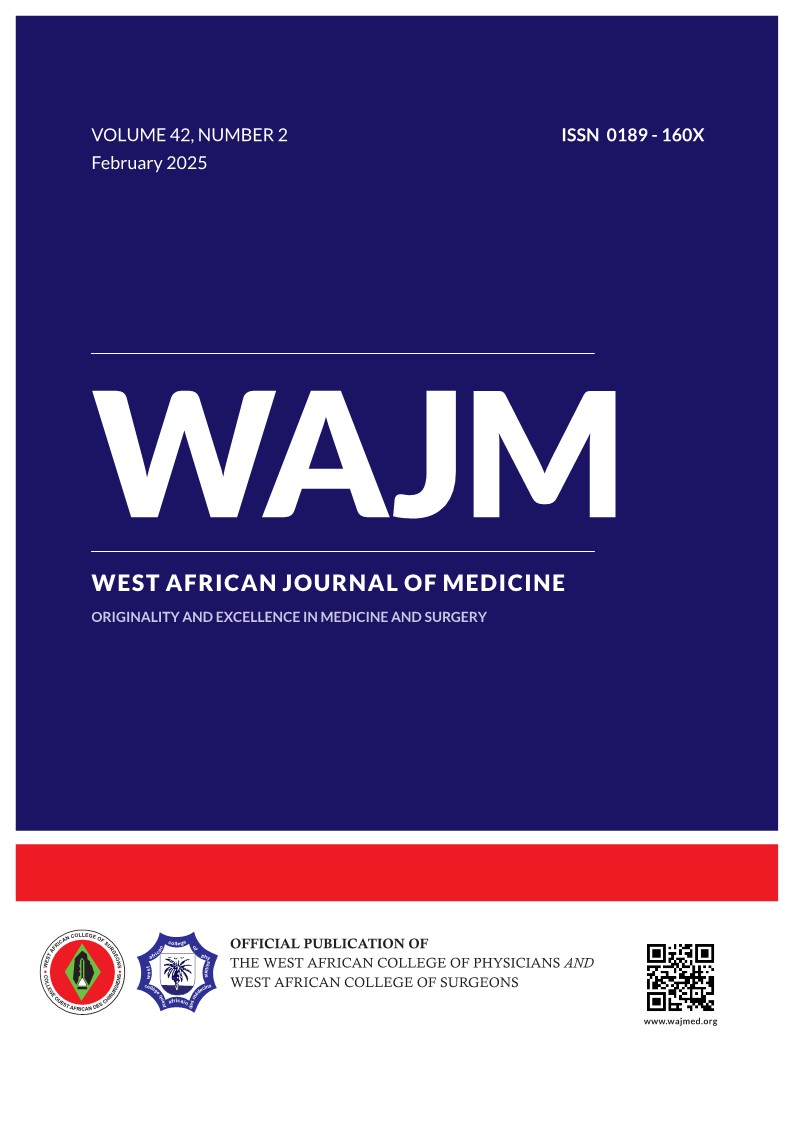EDITORIAL: Confronting the Hidden Wounds-Prioritising Mental Health in Communities affected by Armed Conflicts
West Afr J Med February 2025; 42 (2):79-80 PMID: 40618326
Abstract
In recent decades, sub-Saharan Africa has witnessed multiple armed conflicts that have left behind not only physical destruction but also deep, often overlooked psychological scars. Among the most devastating of these crises is the Boko Haram insurgency, which has ravaged north-eastern Nigeria since 2009. Maiduguri, the capital of Borno State, remains the epicentre of this violence — its people enduring loss, displacement, and repeated exposure to traumatic events that disrupt the fabric of daily life. In this issue of the journal, the study by Wakawa and co-workers draws urgent attention to the psychological aftermath of this prolonged conflict. The findings are striking: several years into the insurgency, more than half of the Maiduguri residents surveyed met the diagnostic threshold for post-traumatic stress disorder (PTSD), while over two-thirds reported significant sub-syndromic PTSD symptoms. Many had endured multiple traumatic events-from loss of loved ones and displacement to violence and abuse. The study further highlights critical psychosocial correlates of PTSD: gender disparities, history of abuse, diminished self-esteem, and low resilience levels were all significantly associated with PTSD risk.
These figures, though alarming, echo patterns observed in other conflict settings worldwide, where the mental health toll often remains under-addressed amid the focus on physical reconstruction and security operations. Left unrecognised, PTSD and related mental health conditions can undermine recovery, fuel cycles of violence, and hinder community resilience.1-4 This study reinforces the urgent need for policy makers, humanitarian actors, and health systems to move mental health and psychosocial support from the margins to the core of emergency response and long-term recovery plans. Communities like Maiduguri require accessible mental health services integrated into primary care, trained personnel who can recognise and treat trauma-related disorders, and community-based programmes that strengthen individual and collective resilience. As conflict and displacement continue to affect millions across the region, it is imperative that governments, donors, and stakeholders invest in rebuilding not only infrastructure but also the mental well-being of affected populations. Addressing the hidden burden of the mental health effects of armed conflicts is not just a clinical necessity-it is a moral, social, and developmental imperative for sustainable peace and stability.2-4
I welcome the joint editorial on nuclear weapons by the World Association of Medical Editors. The urgent need to eliminate the threat of nuclear war cannot be overstated, particularly in light of recent global developments and rising geopolitical tensions. As medical editors and health professionals, we have a collective responsibility to speak out against the catastrophic humanitarian and environmental consequences of any armed conflict in general and nuclear conflict in particular. It is vital that we continue to advocate for disarmament, promote dialogue, and support policies that protect present and future generations from this existential threat.
In addition to addressing the aftermath of armed conflict, this issue also draws attention to other important but often neglected aspects of health and well-being in our region. In their study, Bakare et al. shed light on the high prevalence of work-related stress among academic staff at Lagos State University, finding that 80.5% of lecturers reported significant stress levels, with interference in leisure time affecting over a third. Notably, large family size, male gender, being single, and shorter work experience emerged as key drivers of this occupational burden. Their findings make a compelling case for universities and policymakers to prioritise work-life balance initiatives and cultivate healthier, more supportive work environments that protect staff wellbeing and sustain productivity. Badmus et al., examined predictors of erectile dysfunction (ED) among Nigerian men living with type 2 diabetes mellitus. Their study confirms that ED remains a common but frequently overlooked complication in diabetic men, strongly associated with poor blood sugar control, advancing age, longer disease duration, hypertension, and obesity. By identifying these risk factors, the authors advocate for routine sexual health assessments within diabetes care and highlight the importance of patient education and lifestyle modifications to prevent and manage diabetes-related ED. Together, these studies remind us that the burdens people carry — whether mental, occupational, or intimate — deserve thoughtful, proactive responses embedded within our health systems and institutions.
We express our heartfelt appreciation to our dedicated authors, diligent reviewers, and the wider WAJM community for their unwavering commitment to advancing medical scholarship in our region. We are also pleased to share that a special edition is on the horizon, dedicated to showcasing cutting-edge research, transformative ideas, and novel discoveries across all fields of Medicine-with a proud spotlight on West African contributions. We warmly encourage researchers to submit original studies and reviews for this special issue; all submissions will be fast-tracked for consideration, and accepted manuscripts will benefit from special waivers on the processing fee. We count on your continued partnership, quality submissions, and steadfast support to ensure that WAJM remains a leading forum for impactful, relevant medical research that shapes better health outcomes for all.
Prof. G. E. Erhabor
Editor in chief
REFERENCES
- Moreno-Chaparro J, Piñeros-Ortiz S, Rodríguez-Ramírez L, Urrego-Mendoza Z, Samacá-Samacá D, Garzón-Orjuela N, et al. Mental health consequences of armed conflicts in adults: an overview. Actas espanolas de psiquiatria. 2022;50(2):68.
- Carpiniello B. The mental health costs of armed conflicts—a review of systematic reviews conducted on refugees, asylum-seekers and people living in war zones. International journal of environmental research and public health. 2023;20(4):2840.
- Goto R, Guerrero AP, Speranza M, Fung D, Paul C, Skokauskas N. War is a public health emergency. The Lancet. 2022;399(10332):1302.
- Femi-Lawal VO, Kabiawu YN, Obinna GG, Oladeru OF, Aliu SO, Basa FU, et al. Effects of armed conflicts and insecurity on the mental health of Nigerians. Razi International Medical Journal. 2023;3(1):1-5.
https://pubmed.ncbi.nlm.nih.gov/40618326/


